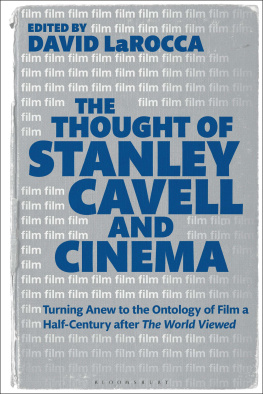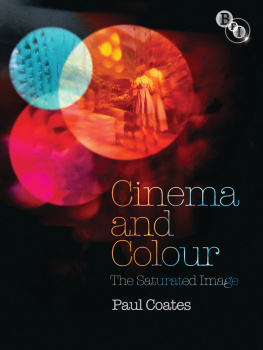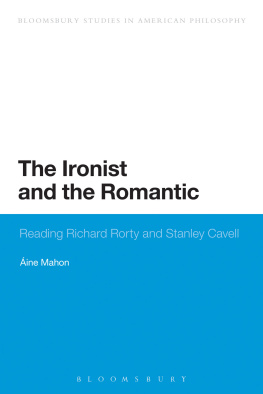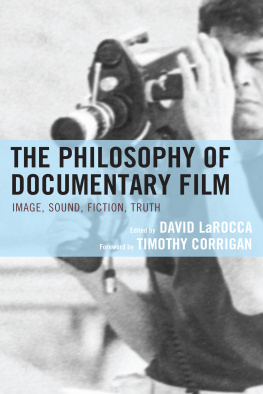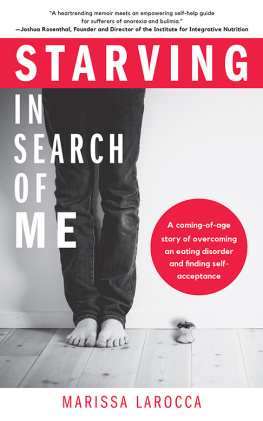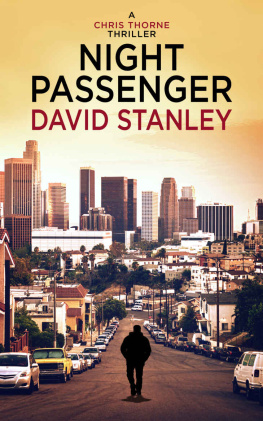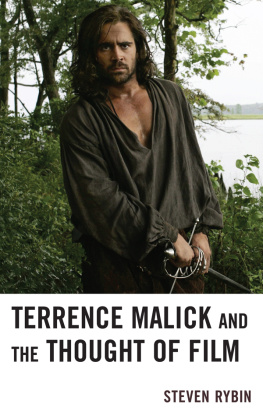LaRocca David - The Thought of Stanley Cavell and Cinema
Here you can read online LaRocca David - The Thought of Stanley Cavell and Cinema full text of the book (entire story) in english for free. Download pdf and epub, get meaning, cover and reviews about this ebook. publisher: Bloomsbury Academic & Professional, genre: Science. Description of the work, (preface) as well as reviews are available. Best literature library LitArk.com created for fans of good reading and offers a wide selection of genres:
Romance novel
Science fiction
Adventure
Detective
Science
History
Home and family
Prose
Art
Politics
Computer
Non-fiction
Religion
Business
Children
Humor
Choose a favorite category and find really read worthwhile books. Enjoy immersion in the world of imagination, feel the emotions of the characters or learn something new for yourself, make an fascinating discovery.
- Book:The Thought of Stanley Cavell and Cinema
- Author:
- Publisher:Bloomsbury Academic & Professional
- Genre:
- Rating:5 / 5
- Favourites:Add to favourites
- Your mark:
- 100
- 1
- 2
- 3
- 4
- 5
The Thought of Stanley Cavell and Cinema: summary, description and annotation
We offer to read an annotation, description, summary or preface (depends on what the author of the book "The Thought of Stanley Cavell and Cinema" wrote himself). If you haven't found the necessary information about the book — write in the comments, we will try to find it.
The Thought of Stanley Cavell and Cinema — read online for free the complete book (whole text) full work
Below is the text of the book, divided by pages. System saving the place of the last page read, allows you to conveniently read the book "The Thought of Stanley Cavell and Cinema" online for free, without having to search again every time where you left off. Put a bookmark, and you can go to the page where you finished reading at any time.
Font size:
Interval:
Bookmark:

The Thought of Stanley Cavell and Cinema
AUTHORED, EDITED, OR COEDITED BOOKS BY DAVID LaROCCA
On Emerson
Emersons Transcendental Etudes by Stanley Cavell
The Philosophy of Charlie Kaufman
Estimating Emerson: An Anthology of Criticism from Carlyle to Cavell
Emersons English Traits and the Natural History of Metaphor
The Philosophy of War Films
A Power to Translate the World: New Essays on Emerson and International Culture
The Bloomsbury Anthology of Transcendental Thought: From Antiquity to the Anthropocene
The Philosophy of Documentary Film: Image, Sound, Fiction, Truth
The Thought of Stanley Cavell and Cinema
Turning Anew to the Ontology of Film a Half-Century after The World Viewed
Edited by
David LaRocca

Contents
Thomas Elsaesser
David LaRocca
Garrett Stewart
Nol Carroll
Kyle Stevens
Stephen Mulhall
Scott MacDonald
William Rothman
Robert Sinnerbrink
Thomas E. Wartenberg
Lawrence F. Rhu
Shawn Loht
Sandra Laugier
Mathew Abbott
David LaRocca
a reader arriving at the first line of the first chapter may wonder what Garrett Stewart means when he says, Celebrationand further spurred celebrationis the business at hand. Little room, or even occasion, for lament. As a quick midrash, the lament is for Stanley Cavells death at the age of ninety-one on June 19, 2018. Juneteenth. The celebration, well, the celebration is in some sense everything before and after that cleave point: the remarkable ninety-one years that led up to it and the now boundless future that awaits his legacy. We, those gathered together in this volume, and those who pick it up to read it, are part of this other side. We are still here to think about Cavell and so we shall.
Given the timelines for most scholarly books, from pitch to production to publication, it should go without saying that Stanley died during the gestation of this project. So though the collectionits topic, its mandate, what we might hope for it and from itwas conceived while he was still a living companion to our thinking, part of our inheritance of his work (his singular voice, his distinctive philosophical bequest) is to discover how to continue that companionship in his absence. As a result, as editor, I found myself deliberating with contributors about changing the tense of verbs (Is would less bittersweet now? asked one attuned reader of a sentence that was written before his death but read after it).
Cavells writingwith a voice like no other in philosophy now, or ever (said Arthur Danto)is perhaps uniquely gifted with his presence. He is still audible to us, though we may have never met him; this attribute of his prose, surely, owing as much to his uncommon philosophical acumen as his mastery of a life in letters, must be counted as another virtue of his talent. As many contributors to this volume have spent decades reading and responding to Cavell, so, happily, there remains much left to say, to think. As it happened, what was meant to be another intervention into the ongoing reception of Cavells work has become an inadvertent memorial. Though Cavell will not see this book, we, the contributors, might hope it is a fitting tributepart of our effort at making our way in the world without him, if ever, gratefully and gratifyingly in the continued company of his prose.
If Cavells work was the object of our attention in creating these pages, and his memory part of our encounter with it hereafter, it is to the contributors of the volumeto their workthat I sincerely offer my most immediate and heartfelt thanks. I have been continually impressed by the force and effect of their ingenuity and am grateful for their generosity in making such findings and innovations available for this occasion.
The four astute (and anonymous) referees for the press were absolutely essential to the final form of the manuscript. They proposed, in one perceptive appraisal after another, probing notes for refinement that made me and the contributors feel very much in good hands. To the referees: thank you for your time, care, and, of course, suffering the particular ache that must come from doing a good job that will (seemingly) remain (forever) unknown to your obliged peers. Though we do not know who you are, our work is better for your labors. At such moments, one feels a true realization of an academic community operating in good faith, with good will.
It is a continual pleasure to thank Haaris Naqvi for his reliable, informed judgment; I so very much appreciate his perspective and his fellowship. And now, at last, with delight, I get to thank Katie Gallof, who so ably shepherded this book to its present incarnation; her savvy reading and incisive responses prompted many delightful innovations for which I am duly grateful. I wish to extend my thanks to her competent colleagues at Bloomsbury who lent their care and skills to the projectespecially Erin Duffy and the ever-impressive design team. And lastly, Arub Ahmed, Zo Jellicoe, and Leela Ulaganathan, who made the final phase of production seamless.
Engagement with colleagues and students at several institutions have been crucial to the development of this and related initiatives, in particular, while I served as Visiting Scholar in the Department of English at Cornell University; Lecturer in the Department of Cinema, Photography, and Media Arts at the Roy H. Park School of Communications at Ithaca College; Visiting Assistant Professor in the Department of Philosophy at the College at Cortland, State University of New York; and Visiting Assistant Professor in the Cinema Department at Binghamton University.
I have enjoyed an unexpected bounty of good summer hours among remarkable visitors to Ithaca, many of them arriving for participation in The School of Criticism and Theory at Cornell University. In recent years, Hent de Vries has presided as an adroit moderator, matched auspiciously by his legendary presentations. I wish to thank him for his rare combination of affability and penetrating reflection. In this same substantive, if temporary, community, I convey my thanks to Emily Apter and members of the Thinking in Untranslatables seminar as well as to Philippe Descola, Shoshana Felman, Avishai Margalit, Michael Puett, and Anthony Vidler.
An invitation to the University of Arizona in April 2018, for the New Directions conference, placed me in the company of a receptive and canny audience. Emily Thomas conscientious hosting and cordial introduction to her community, including student and faculty members of the Department of English, made the occasion a pleasure and propitious. Fielding informed questions about film sound and genre and making relevant forays into experimental and avant-garde cinema were decisive for refinements of thought.
An invitation to Israel, with time spent in the company of gracious hosts Shai Biderman, Dan Geva, and Ohad Landesman proved transformative. The Docusophia: Documentary Film and Philosophy conference in May 2018, sponsored by the Steve Tisch School of Film and Television, Tel Aviv University, in collaboration with the Docaviv Film Festival, provided a chance to hear many crucial remarks on the state of documentary films conjunction with philosophy and to learn from Linda Williams and Thomas Wartenberg, students and scholars based in Israel, among many others. Meeting Avner Faingulernt in Tel Aviv was a highlight (thank you Diana Allan for liaising the connection). For intellectual and cinematic adventuring in Tel Aviv and Jerusalem, I am joyfully indebted to Dan Geva, his family, and their friends and colleaguesincluding members of the Jerusalem Sam Spiegel Film School. And for unmatched accommodation in Jerusalem, I remain grateful to Amos and Jan Avgar (and Ariel and Christie Avgar back in Ithaca).
Font size:
Interval:
Bookmark:
Similar books «The Thought of Stanley Cavell and Cinema»
Look at similar books to The Thought of Stanley Cavell and Cinema. We have selected literature similar in name and meaning in the hope of providing readers with more options to find new, interesting, not yet read works.
Discussion, reviews of the book The Thought of Stanley Cavell and Cinema and just readers' own opinions. Leave your comments, write what you think about the work, its meaning or the main characters. Specify what exactly you liked and what you didn't like, and why you think so.

